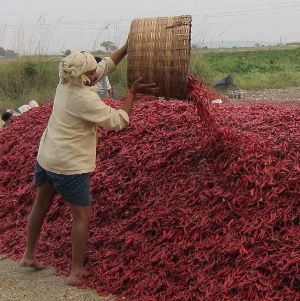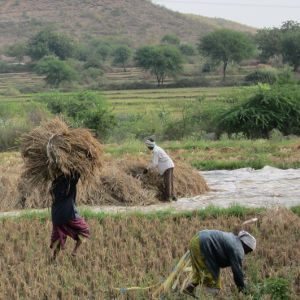వ్యవసాయం
తెలుగు దేశంలో చాలా మందికి వ్యవసాయమే ముఖ్య వృత్తి. పొలం వున్న వాళ్లు, లేని వాళ్లు కూడా వ్యవసాయపు పనులే చేస్తారు. ఫ్యాక్టరీల్లోనూ ఆఫీసుల్లోనూ పని చేసే వాళ్లు ఎక్కువ మంది పట్నవాసాల్లోనే కనిపిస్తారు. పెద్ద బస్తీలు తెలుగు దేశంలో ఎక్కువ లేవు. హైదరాబాదు, విజయవాడ మినహా యిస్తే, మిగిలినవి అన్నీ చిన్న తరహా పట్టణాలే.
 తెలుగు దేశంలో ముఖ్యమైన పంట వరి. కృష్ణా, గోదావరి జిల్లాల్లో వరి బాగా పండుతుంది. గోదావరిమీదా, కృష్ణమీదా ఆనకట్టలు కట్టిన రోజులనించీ అక్కడ వ్యవసాయానికి కావలసిన నీరు పుష్కలంగా దొరుకుతోంది. నీరు అందిన పల్లపు పొలాల్లో వరి బంగారంలా పండుతుందంటే నమ్మండి.
తెలుగు దేశంలో ముఖ్యమైన పంట వరి. కృష్ణా, గోదావరి జిల్లాల్లో వరి బాగా పండుతుంది. గోదావరిమీదా, కృష్ణమీదా ఆనకట్టలు కట్టిన రోజులనించీ అక్కడ వ్యవసాయానికి కావలసిన నీరు పుష్కలంగా దొరుకుతోంది. నీరు అందిన పల్లపు పొలాల్లో వరి బంగారంలా పండుతుందంటే నమ్మండి.
మిగిలిన జిల్లాల్లో చాలా మటుకు మెట్ట పొలాలు. మెట్ట పొలాల్లో వేరుశనగ, జొన్న - ఇలాంటి పంటలు పండిస్తారు. మిరప, పసుపు, పొగాకు లాంటి పంటలు పండే చోట్లు చాలా వున్నాయి కూడా.
పల్లపు పొలాల్లో అరిటి, చెరుకు, వేసే రైతులున్నారు. మెట్ట జాగాల్లో కొబ్బరి తోటలూ మామిడి తోటలూ వున్న జిల్లాలున్నాయి.
మెట్ట పంటల్లో ముఖ్యమైనది జొన్న. వరి పండని జిల్లాల్లో ఎక్కువగా జొన్నలు పండిస్తారు. రాగులు, చోళ్లు పండిస్తారు కొన్ని చోట్ల.
తెలుగు దేశంలో నేలంతా ఒక రకమైనది కాదు. కృష్ణా గోదావరిడెల్టా భూములు అంతా నల్ల రేగడి నేల. విశాఖపట్నం ప్రాంతం ఇసక నేల. రాయలసీమలో చాలా చోట్ల ఎర్ర మట్టి నేల.
పొలాలు దున్నడానికి రైతులు చాలా చోట్ల ఎడ్లని వాడతారు. కొన్ని చోట్ల పోతులతో దున్నిస్తారు. నాగలీ, ఎడ్లతో వ్యవసాయం చేసే అలవాటు ఇప్పుడిప్పుడే మారి, ట్రాక్టర్లూ మర నాగళ్లూ అమలులోకి వొస్తున్నాయి.
 ఎన్ని నదులున్నా, ఎన్ని కాలువలున్నా, తెలుగు దేశంలో ఇంకా చాలా నేల వర్షాలవల్ల పండవలసిందే. వ్యవసాయానికి వానలు ప్రాణం. సకాలంలో తొలకరి వానలు పడకపోతే ఆ ఏడు పంటలు దెబ్బ తింటాయి. కాని, వాన రాకడ — ప్రాణ పోకడ అన్నారు; ఆ రెండూ ఎవడూ చెప్పలేడు, ఎప్పుడు జరుగుతాయో.
ఎన్ని నదులున్నా, ఎన్ని కాలువలున్నా, తెలుగు దేశంలో ఇంకా చాలా నేల వర్షాలవల్ల పండవలసిందే. వ్యవసాయానికి వానలు ప్రాణం. సకాలంలో తొలకరి వానలు పడకపోతే ఆ ఏడు పంటలు దెబ్బ తింటాయి. కాని, వాన రాకడ — ప్రాణ పోకడ అన్నారు; ఆ రెండూ ఎవడూ చెప్పలేడు, ఎప్పుడు జరుగుతాయో.
వానలు కొంచెం అటూ ఇటూ అయితే, పల్లపు పొలాలకి కాలవ నీళ్లు పెడతారు. కాని మెట్ట పొలాలకి ఏతలతో నీళ్లు తోడాల్సిందే. పంపులతో నీళ్లు తోడడం ఈ మధ్య చాలా మంది చేస్తున్నారు.
నీరు అందే పొలాలలో వరి సంవత్సరానికి రెండు పంటలు పండిస్తారు. ఎకరాకి ఎంత పండుతుందన్నది — పొలాన్ని బట్టీ, ప్రాంతాన్ని బట్టీ వుంటుంది.
ఏ పంట ఎప్పుడు ఊడుస్తారు, ఎప్పుడు కోస్తారు — ఇలాంటి వివరాలు మీకు దగ్గిరగా వున్న పల్లెటూరు వెళ్లి అడిగి తెలుసుకోండి. పొల్లాలో పని చేసే వాళ్లతో మాట్లాడితే వ్యవసాయం గురించి బోలెడు సంగతులు తెలుస్తాయి మీకు.
మవ్యవసాయం టీక
| వ్యవసాయం | “agriculture” |
| వ్యవసాయమే | “agriculture only” వ్యవసాయం + ఏ definitive |
| ముఖ్య వృత్తి | “chief occupation” ముఖ్య Skt. adjective “chief” qualifies only Sanskrit nouns. ముఖ్యమైన adj. derived from Sanskrit, qualifies any noun, including Sanskrit nouns. |
| పొలం వున్న వాళ్లు | “those who own farmland” పొలం “farm land” వున్న verbal adj. of ఉండు “to be; have, possess” వాళ్లు “people” |
| లేని వాళ్లు | “those who do not own (farm land)” లేని neg. verbal adj. of ఉండు |
| కూడా | “both” |
| వ్యవసాయపు పనులే | “only agricultural work” వ్యవసాయపు adj. form of వ్యవసాయం పని “work”. పనులు plural “jobs, work” + ఏ definitive |
| ఫ్యాక్టరీల్లోనో | “(either) in factories” |
| ఆఫీసుల్లోనో | “(or) in offices” |
| పని చేసే వాళ్లు | “those who work” పని “work” చేసే verbal adj. of చేయు “to do” వాళ్లు “people” |
| ఎక్కువమంది | “many people” ఎక్కువ “many, much” + మంది suffix indicating people. |
| పట్నవాసాల్లోనే | “only in towns” పట్నవాసం “town” పట్నవాసాలు plural పట్నవాసాల oblique + లో locative suffix + న్ glide +ఏ definitive |
| కనిపిస్తారు | “are seen” కనిపించు “to appear, to be seen |
| పెద్ద బస్తీలు | “big cities” పెద్ద “big” బస్తీ “city” |
| ఎక్కువ | “many” |
| విజయవాడ | “Vijayawada” A city in Andhra Pradesh. |
| హైదరాబాదు | “Hyderabad” Capital city of Telangana. |
| మినహాయిస్తే | “if not counted” మినహాయించు “to discount, ignore” |
| మిగిలినవి | “remaining places” మిగిలిన verbal adj. of మిగులు “to remain” |
| అన్నీ | “all (places)” |
| చిన్న తరహా పట్టణాలే | “small towns” చిన్న “small” తరహా “variety, type” పట్టణం “town” ఏ definitive |
| ముఖ్యమైన | “chief” see ముఖ్య above |
| పంట | “crop” |
| వరి | “rice crop” వడ్లు “grain” ధాన్యం “grain” బియ్యం “husked rice” అన్నం “cooked rice” |
| కృష్ణా గోదావరి జిల్లాల్లో | “in Krishna and Godavari districts of Andhra Pradesh” |
| బాగా పండుతుంది | “grows well” బాగా “well” పండు “to yield harvest” verbalizer for పంట “crop” |
| ఆనకట్ట | “dam” |
| కట్టిన రోజులనించీ | “since the days (the dams) were built” |
| వ్యవసాయానికి | “for cultivation” |
| కావలసిన నీరు | “necessary water” కావలసిన “required, needed” నీరు “water” singular నీళ్లు “water” plural. The words నీరు and నీళ్లు are largely interchangeable, except in the context of drinking where నీళ్లు is preferred. |
| పుష్కలంగా | “plentifully, abundantly” |
| దొరుకుతోంది | “is available” from దొరుకు “to be available” |
| నీరందిన పల్లపు పొలాల్లో | “in lowlands within reach of water” అందిన verbal adj. of అందు “to reach” మీరు రాసిన ఉత్తరం అందింది. “I received your letter.” ఈ కొమ్మ చాలా ఎత్తు; నాకు అందదు. “This branch is too high, I can’t reach it.” పల్లపు పొలాల్లో “in lowlands, lower than water level” పల్లం n. “low” పల్లపు adj. “low” పొలాలు “lands” |
| బంగారంలా | “like gold”; బంగారం “gold” |
| అంటే | “when it is said so”, conditional of అను “to say” |
| నమ్మండి | “believe it”, imperative of నమ్ము “to believe” |
| మిగిలిన జిల్లాల్లో | “in the rest of the districts”, జిల్లా “district” |
| చాలా మటుకు | “to a large extent”, alt. ~ మట్టుకు |
| మెట్ట పొలాలు | “uplands, higher than water level”
మెట్ట “raised area, small hill” |
| వేరుశనగ | “peanuts” also called “groundnuts” |
| జొన్న | “maize” |
| ఇలాంటి పంటలు | “crops like this” |
| పండిస్తారు | “are grown”
పండించు “to raise (crops)”, causative of పండు “to ripen” |
| మిరప | “red chillies” |
| పసుపు | “turmeric” |
| పొగాకు | “tobacco” |
| ~ లాంటి పంటలు | “and other similar crops”, ~ లాంటి “similar to, like”, alt. ~ లాటి |
| పండే చోట్లు | “places where (such crops) grow”, చోటు “place” |
| అరిటి | “banana” |
| చెరుకు | “sugar cane” |
| వేసే రైతులు | “farmers who raise (banana and other crops)”, రైతు “farmer” వేసే verbal adj. of వేయు “to grow crops, plants, etc.” |
| మెట్ట జాగా | “high land”, జాగా “land, place” |
| కొబ్బరి తోట | “coconut grove” |
| మామిడి తోట | “mango grove” |
| మెట్ట పంటల్లో | “in crops grown on high lands” |
| జొన్న | “maize” |
| రాగులు | plural of రాగి “(a type of) millet” typically used in the plural |
| చోళ్లు | plural of చోడి “(a type of) millet” typically used in the plural |
| నేల | “soil” |
| ఒక రకమైనది కాదు | “is not just one type” ఒక “one” రకమైన adj. from రకం “type, variety” ది pronoun, కాదు “is not” |
| డెల్టా భూములు | “delta lands” |
| నల్ల రేగడి నేల | “black soil, black cotton soil”, నల్ల “black”, రేగడి “clay soil” |
| విశాఖపట్నం | “Vishakhapatnam” a district in Andhra Pradesh |
| ప్రాంతం | “area” |
| ఇసక నేల | “sandy soil” ఇసక “sand” |
| రాయలసీమ | “Rayalasima” the south western region of Andhra comprised of Anantapur, Kudapa, Kurnool, and Chittoor districts. |
| చాలా చోట్ల | “in many places”, చోట్లు “places”, చోట్ల oblique, + అ locative suffix |
| ఎర్ర మట్టి నేల | “red soil” ఎర్ర “red” మట్టి “dirt” నేల “soil, earth” |
| దున్నడానికి | “for tilling”, దున్ను “to till” |
| ఎడ్లని | acc. of ఎడ్లు “bullocks, oxen”, ఎద్దు singular “bullock, ox” |
| పోతులతో | “with (the aid of) water buffaloes” పోతులు “water buffaloes” + తో |
| నాగలీ, ఎడ్లతో | “with నాగలి and ఎడ్లు”, నాగలి n. “plow” |
| అలవాటు | “habit” |
| ఇప్పుడిప్పుడే | “recently” ఇప్పుడు + ఏ definitive |
| మారి | from మారు “to change” |
| ట్రాక్టర్లు | “tractors” |
| మర నాగళ్లు | “machine-plows” మర “machine”, నాగళ్లు pl. of నాగలి |
| అమలులోకి వస్తున్నాయి | “are coming into use” అమలు n. “use, operation, adoption”, లోకి “into” వస్తున్నాయి from వచ్చు “to come” |
| ఎన్ని నదులున్నా | “no matter how many rivers there are” నదులు “rivers” sing. నది; ఉన్నా concessive of ఉండు |
| కాలవలు | “canals” |
| ఇంకా | “still” |
| చాలా నేల | “much land” |
| వర్షాల వల్ల | “by rain fall” వర్షాలు “rains”, sing. వర్షం, వల్ల p.p. “by, due to” |
| పండవలసిందే | “could only be cultivated (by rain)”, ~ వలసిన verbal adj. of ~ వలయు, ది pronoun, ఏ definitive, emphasizing the inevitability of the means (of cultivation), ~ వలసిందే is used to indicate absence of option or alternate means.
మీరు మామిడి పళ్లు తినాలంటే, వేసం కాలం దాకా ఆగవలసిందే. “If you want to eat mangoes, you have to wait until summer.” మీరు పూర్ణా మార్కెట్లో కూరలు కొనాలంటే, తెలుగులో మాట్లాడవలసిందే. “If you want to buy vegetables in Poorna market, you have to speak Telugu.” |
| వ్యవసాయానికి | “to agricultural activity” |
| వానలు | “rains” |
| ప్రాణం | “(are) the live breath” |
| సకాలంతో | “in proper time” |
| తొలకరి వానలు పడకపోతే | “if monsoon rains to not fall” తొలకరి “monsoon” |
| ఆ ఏడు | “that year” |
| పంటలు | “crops” |
| దెబ్బ తింటాయి | “fail” దెబ్బతిను “to be adversely affected, to fail” |
| వాన రాకడ, ప్రాణ పోకడ | “the coming of rain and the passing of life” A saying in Telugu which brings together two unpredictable events as an analogy for each other: rain and death. రాకడ n. “arrival”, పోకడ n. “departure”, ప్రాణ adj. “of life” from ప్రాణం “life-breath” |
| అన్నారు | “it is said” |
| ఆ రెండూ | “both of those (events)” |
| ఎప్పుడు జరుగుతాయో | “when they would happen”, జరుగు “to happen” |
| ఎవడూ | “nobody” when used with a neg. verb |
| చెప్పలేడు | “cannot say”, neg. of ability from చెప్పు “to predict” |
| కొంచెం | “a little” |
| అటూ ఇటూ అయితే | “too late, or too early”, అటు lit. “that way”, ఇటు lit. “this way” |
| కాలవ నీళ్లు | “canal water” |
| పెడతారు | “supply”, from పెట్టు “to put, to serve” |
| ఏతాలతో | “with the aid of ఏతాలు pl. of ఏతం a type of manual pump; Ask a farmer to show you an ఏతం when you visit a village. |
| తోడాల్సిందే | “One should manually pump water. No other way.” From తోడు “to pump from a lower level” తోడ infinitive + -ఆల్సిన < వలసిన verbal adj. of వలయు “to need”, ది pronoun, + ఏ emphatic. See above for examples. |
| పంపులతో | “with pump-sets” |
| ఈమధ్య | “recently” |
| నీరు అందే పొలాల్లో | “in lands where water is available” |
| సంవత్సరానికి | “per year” |
| రెండు పంటలు | “two crops” |
| ఎకరాకి | “per acre” ఎకరా “acre” alt. ఎకరం |
| ఎంత | “how much” (grain) |
| పండుతుంది | “will grow” |
| అన్నది | “that matter” |
| పొలాన్ని బట్టి | “depending on the land” |
| ప్రాంతాన్ని బట్టి | “depending on the area” |
| ఊడుస్తారు | from ఊడ్చు “to transplant” alt. ఉడుచు |
| కోస్తారు | from కోయు “to reap” |
| వివరాలు | “details” sing. వివరం |
| దగ్గరగా వున్న పల్లెటూరు | “a nearby village” దగ్గర “near” |
| తెలుసుకోండి | “find out, come to know” |
| పని చేసే వాళ్లు | “working people” |
| బోలెడు | “many” |
| సంగతులు | “facts, information” |
| తెలుస్తాయి | “will become known” from తెలియు “to be known” |